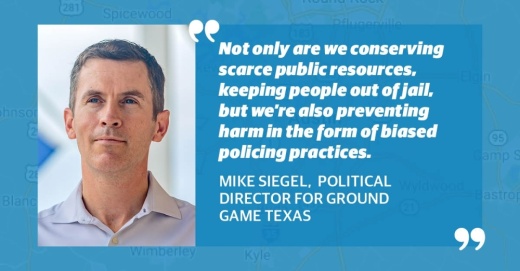The proposition would codify an end to low-level marijuana enforcement and ban police from executing no-knock warrants in Austin. Proposition A made it onto the ballot following a successful petition drive by the statewide political engagement group Ground Game Texas. If approved by voters, the city said the measure would take effect immediately after the election is canvassed later this month.
Ahead of election day, Mike Siegel, a former Democratic Congressional candidate and Ground Game's political director, spoke with Community Impact Newspaper to discuss the proposition and his organization's voter mobilization tactics. This interview was edited for length and clarity.
How did Proposition A, or the 'Austin Freedom Act,' come together?
Workers, wages and weed. These are like wedge issues that are considered to be progressive issues, but they’re more popular than the Democratic Party itself. ... Austin was really just the prototype, the test case, for the mission of Ground Game. Because really the turnout problem is not Austin. The turnout problem is a lot of other cities across the state.
Separately, the [criminal justice] reform movement had lobbied for a ban on no-knocks ... These are both things where the representatives of the people of Austin had already said, ‘We want this.’
[We] qualified for the ballot in Austin and then since then have expanded. We’ve got five other cities we’re working in on marijuana [decriminalization], plus other campaigns in four other cities.
Given that it is already Austin police policy, why are you seeking to limit marijuana enforcement through city code?
A lot of people weren’t aware of what the City Council did, and so this brings it more directly to the attention of the Austin voters.
Most importantly, this formalizes the reforms to make sure a subsequent city manager or chief doesn’t just arbitrarily decide to drop it. Once it becomes part of the city code, to change it—even if the council wanted to change it in a couple of years—they would have to notice a hearing. They’d have to do it in public. Whereas, the way the police manual’s put together, a subsequent chief could basically drop it from the manual and change policy in that way.
By codifying it, by passing this law in a formal way, it does lay down a marker for other cities across Texas to follow. ... If we go city by city passing these reforms, that’s then going to put pressure on the state legislature to finally get it done.
How would you say Ground Game's other campaigns are going?
Very well. ... Once we proved that we could do it in Austin—that it wasn’t just me talking, that [Julie Oliver, Ground Game Texas executive director] and I built a team, we qualified for the ballot—that then gave other folks more encouragement.
We’re now working in Killeen and Harker Heights in Bell County, Elgin in Bastrop County, Denton up in North Texas and San Marcos a little south. ... It looks like those additional measures are going to be all on the November ballot in their respective cities.
What change do you believe Proposition A would bring in Austin?
Keeping people out of the criminal justice system is huge. Before the Austin reforms started, we were arresting, in Austin, over 300 people a year on Class A, Class B [misdemeanor] marijuana possession. And so that’s several hundred people a year that aren’t going directly to jail. We were also issuing over 3,000 tickets a year, which are essentially subject to a warrant if you don’t comply. And so we are directly keeping thousands of people out of the criminal justice system.
Another extremely important impact is that we’re taking away a tool that was often used for biased enforcement. ... Marijuana laws in this country have been used to oppress Black and Latino communities, in particular, [and] young, working-class people of color, in particular.
The kind of glib way to say it is, they were making arrests for marijuana possession on the east side, but they weren’t raiding the frat houses. We know white kids in college smoke just as much weed as anyone else, but they weren’t suffering the brunt of police enforcement.
Not only are we conserving scarce public resources, keeping people out of jail, but we’re also preventing harm in the form of biased policing practices.
Why did you decide to group marijuana enforcement and a no-knock warrant ban together?
Fundamentally, it was at the urging of our partner, the Austin Justice Coalition, which is very active advocating for criminal justice reform across the city. They wanted it. And we also wanted to test a broader theory that marijuana reform could be a way to usher in other reforms as well.
Marijuana may not be a gateway drug, but it can be a gateway issue. So the idea being, if you get people out to vote because legal weed captures their attention, then we can get a second popular reform passed at the same time.
This was a great opportunity to basically utilize this direct democracy tactic, go straight to the people and get two important reforms passed at the same time.
Have you been tracking opposition to this measure?
No one is spending money against it. ... From what we know, there’s been not even any internal organizing within the [Austin Police Association], ‘Hey, members, vote against this.’ Because really, there’s no one that’s arguing for keeping no-knock warrants.
You can still do a raid; all you have to do is announce yourself from afar and wait 15 seconds. You can use a loudspeaker, [a long-range acoustic device], one of their tools. So there’s that workaround.
But also, if we’re talking about terrorism, federal agents can still conduct no-knock raids in Austin. This ordinance does not regulate [Texas Department of Public Safety] officers. It does not regulate federal law enforcement. And so if there’s an extreme event where a no-knock raid is absolutely needed, there’s other ways to get that done.
With early voting closed as of May 3, what do you think of turnout so far?
Right now, we have Travis County at 58,000-plus overall votes, including mail-in ballots, and that’s more than Harris, Dallas or Bexar counties. And so that’s a small little proof point—obviously, we’re going to have to tease that out to get the Austin voters. But if we boosted turnout in what may have been a very sleepy statewide constitutional ballot measure, that furthers our point that these issues, the ‘workers, wages and weed’ issues, could be ways to get people more involved in Texas elections.





